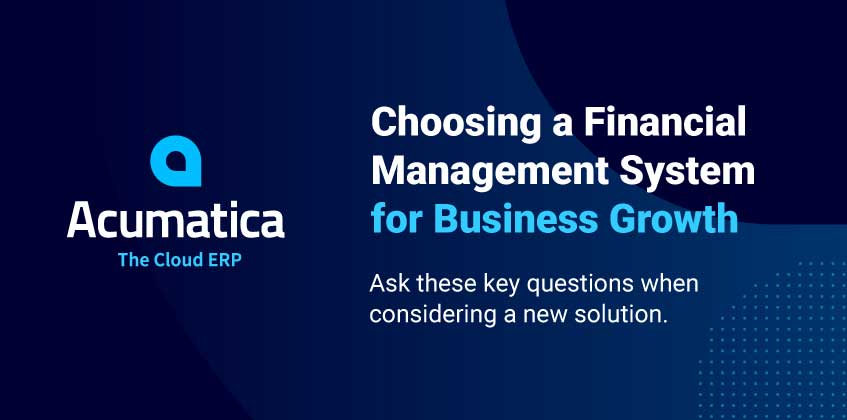
Small and mid-sized businesses (SMBs) make up 99.9% of American businesses, and are the lifeblood of the U.S. economy—an economy that’s being increasingly stifled by the threat of recession, ongoing global trade tensions, and lingering inflationary pressures. Not surprisingly, many of the SMBs I’ve spoken with remain optimistic saying their drive to succeed has not diminished in the face of economic uncertainty.
But this determination to grow is made all the more difficult with some common issues many SMBs are facing like talent scarcities, which have made financial forecasting problematic, have impacted their cash flow, and have increased overall corporate debt. Sadly, such financial pressure is often one of the main reasons businesses fail.
One way SMBs can relieve this ongoing pressure and experience growth in the face of a challenging economic environment is to move beyond a reliance on simple business software or outdated legacy solutions and adopt modern financial management systems.
Financial Management Systems: What Do They Do?
Financial management systems essentially help businesses do all the things that help them run their operations. They are single software platforms that enable businesses to effectively track, manage, and grow their financial resources using built-in accounting, budgeting, financial planning, financial reporting, and cash management features. With these features, business leaders obtain a clear view into the organization’s financial health, allowing them to make data-driven decisions that enhance profitability.
SMBs are diverse and vary in size and complexity. So, each company must choose a financial management system that can be personalized to fit their specific needs while also coming at a price they can afford. There are plenty of financial management system from which to choose, ranging from basic accounting software to comprehensive Enterprise Resource Planning (ERP) solutions, but unlike simple accounting solutions, ERP solutions equip SMBs with robust financial tools that deliver powerful benefits.
Powerful Benefits with the Right Financial Management System
As noted, an ERP solution and its financial management features offer a number of business-enhancing benefits. For example, because an ERP solution enables SMBs to manage their income, assets, and expenses from a single, future-proof platform, their financial data streams into and out of one solution, providing them with a single source of truth as well as real-time information that provides insights for improving financial forecasting and budgets. Automated features driven by artificial intelligence and machine learning eliminates many manual-powered tasks, leading to fewer human and data errors.
Choosing the right ERP system will help SMBs:
- Connect their multiple departments and applications (e.g., finances, sales, marketing operations, and third-party applications), ensuring important data is accessible across teams.
- Synchronize and update their data to manage planning, investing, and compliance processes.
- Evaluate their overall financial health with sophisticated, built-in reporting and analytical tools.
But while there are plenty of great benefits, truly knowing which financial management system is right for their business requires some homework.
How to Select the Right Financial Management System
By answering these five questions, businesses will have deeper insight into which system will work for them.
- What are our current and future needs? From industry-specific features to being able to tailor a system to their unique requirements, SMBs must determine what they need in order to succeed in today’s—and tomorrow’s—marketplace. Once they identify these needs, SMBs can assess the many financial management system options based on whether they’re able or unable to meet their unique requirements.
- Is the system scalable? Growth is often the baseline businesses use to rate their success, and if the financial management system it chooses can’t grow alongside as well as flex with internal and external changes, then it’s not the right choice.
- Can every team member use or learn how to use the system easily? Investing in a new system is a huge expense and a waste if team members find the system difficult to use.
- How challenging would it be to integrate the system with a third-party application? No matter how comprehensive a financial management system is, a business may have other, very specific applications they need to connect to it. Making sure integrations are possible—and easy—before making the purchase is critical.
- Will the software vendor offer superlative support and top-tier security protocols? Vendor support and security expertise are two factors that can positively or negatively impact the success of a financial management system implementation. Seeking vendor reviews and diligently researching the vendor’s security procedures will ensure that the business is entrusting their financial data to a trustworthy partner.
Securing Business Growth with Acumatica
Acumatica offers a modern and powerful cloud ERP solution that is purposely designed and developed to address the needs of today’s SMBs by connecting their organizations end-to-end, delivering deep insights, streamlining workflows, and delivering seamless collaboration throughout the organization. As a centralized database that synchronizes company-wide data and acts as a single source of organizational and operational truth, Acumatica helps businesses, like The Learning Lab, grow in the face of economic challenges.
Headquartered in Singapore, The Learning Lab is a privately owned educational enrichment organization. They needed a cloud-based ERP solution that could centralize and manage their various financial, CRM, and class-scheduling systems. According to CFO Ying-Jian Chan, growth was not possible in such a disconnected, siloed environment.
“The company was using very outdated accounting software for basic book-keeping,” Chan says. “Our finance team realized this was not sustainable given our volume and growth and set out to replace it with a financial solution with robust financial management for cash management, expense claims and procurement.”
After carefully scrutinizing their ERP options, The Learning Lab team chose Acumatica—and were glad they did. With Acumatica, they were able to:
- Eliminate positions focused on manual data entry between their different financial systems.
- Provide access to every employee at the appropriate security level.
- Give the finance team back time by having employees enter their own expense claims.
The team now has real-time insights into their accounts receivable and accounts payable processes and has one version of the truth for all stakeholders.
“Putting in a solution like Acumatica with efficient business processes ensures that we have good financial governance and controls in place,” Chan says, adding, “With Acumatica being cloud-based, it definitely enables us to work anywhere, at any time, and this is the direction that everything is headed.”
The story of how Acumatica has helped this company take control of their financial health and thrive in a challenging economic environment is a validation of the power and impact of choosing the right financial management system.
To learn more about how Acumatica and our cloud ERP software can help SMBs grow during economically turbulent times, contact our experts today.
Read more from CEO John Case about the importance of financial management systems in his recent Forbes article, “From Survival to Growth: Leveraging the Power of Financial Management Systems.”













